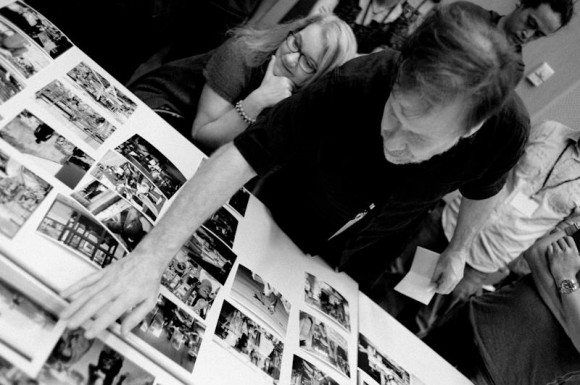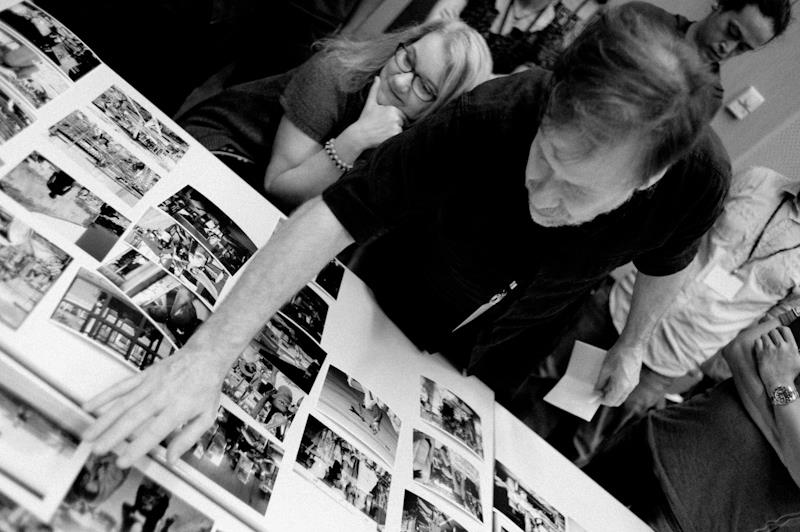Part 3 transcription of the Q&A session during the public talk given by photographers Alex Webb and Rebecca Norris Webb, and David Chickey of Radius Books, at The National Museum Of Singapore on 9th March, 2012.

Motivation
Question: Hi Alex, I wonder when you embark on your journey to photograph a long-term project. I always have a question in my mind, is it going to be worth it. Is it fruitful to go and spend (inaudible) So how do you do it? How do you convince yourself? In the beginning?
Alex: Look, Doubt is perpetual in the process. And, you know, when I start on a project, I don’t know that it is going to be a project. You know, it’s really going to be a question. You know, take some pictures somewhere, hmm, this is kind of interesting.
But, you know, even with the Haiti project, I got very engrossed with the Haiti project in 1986. Basically after I completed the first book, I really thought my next body of work was going to be about Mexico and I work consistently in Mexico in the early, mid-80s.
And then in ‘86 the Duvalier regime fell in Haiti. And I went back to Haiti for the first time in six years, I find it very exciting and intense and decided to keep going back. But, even during this period of time when I kept going back to Haiti, I remember I did make a trip in 1987 to Mexico, I still had this sort of sense of doubt, you know, maybe it’s Mexico, is it really Haiti that I am going for. You know, so, you know, I’m not very convinced about projects being fully worthwhile until I am at least half or two-thirds way through it.
I mean its an obsession, you follow the obsession but at the same time you have so many doubts, you know. Why am I wasting so much money going back to this place, taking more pictures? What’s the point of it? No one cares about it. I think I care about it but maybe I am deceiving myself. (Audience laughs)
You know, I mean, look, this kind of doubt is perpetual, you know. And, err, that’s just the way it is. You live with that struggle and I don’t think it is any different than any of the other art forms. I mean novelists, you know, why do so many write novels that others critique so much? (Audience laughs)
I mean, you know, it’s always this perpetual sense of doubt.
Rebecca: Yeh, that’s a hard question. I have to say that more when I look at this, when I am ready to finish my third book. I have to say that for me, at least, I think that what makes a project sort of linger is that a kind of tension to it, that creates a kind of dynamic.
For instance, in the first book, The Glass Between Us, you know, I felt sort of, a couple years into the project, especially when I am around more intelligent creatures, like the chimpanzees. You know, if I would see suffering in their faces, a part of me would want to head for the door. Another part of me because they are such incredible creatures to look at, wanted me to get a little bit closer. And that tug, that sort of emotional tug is, I think, what created a dynamic of the project. Alex talks about that too, in Haiti that you have a kind of tension, a dynamic to your work and your response to Haiti.
Alex: Yah, I mean, Haiti is one of these places where you know, on the one hand, sometimes when I’ve been there, I just sort of felt I can photograph here forever. And in the same moment, I’m saying I going to run screaming to an airplane and get out of there as quick as possible. (Audience laughs)
I have those emotions at the same time. Other places, perhaps the emotional extremes are not so great but I think, Rebecca is right. I think there is something about a certain level of tension, something you’re trying to work out. You know, I mean, photographing this way is really about trying to understand, you know, what you are photographing.
I mean when I start on the project, it’s really setting off on a journey but I have absolutely no idea where that journey is going to end. You know its not like I know I am going to get here. I go there, I go there. At the end, your pictures on some levels have led you somewhere else. Rebecca likes to say that her pictures are smarter than she is and that’s really a good thing to think about ‘cause I think this process of photographing is a process of, kind of, understand the world visually. And, you know, you begin to understand things that you certainly don’t understand rationally or couldn’t express rationally.
Rebecca: Yeah and I think that it’s just a variation of a sense of collaborating because with photography, the kind of photography when we are not staging anything. It’s very much a way of collaboration with the world and you’re trying to understand whatever that part of the world that you’re working with. And you need, you know, it’s not just you imposing your ideas on top of it. The world is also trying to speak to you through that project. So I think that also create a sort of dynamic, kind of tension.
Text: Sebastian Song
Read All Transcriptions:
Q&A with Alex Webb, Rebecca Norris Webb & David Chickey
Share


Comments 6
RT @InvisPhotogAsia: Q&A with Webbs & Chickey Part 3: Motivation http://t.co/eH0b8zP2
@InvisPhotogAsia – Q&A with Webbs & Chickey Part 3: Motivation http://t.co/vLDq6RDQ #Asia #photography
Q&A with Webbs & Chickey Part 3: Motivation http://t.co/azx6Ypri
https://invisiblephotographer.asia/2012/03/22/qa-with-webbs-chickey-part-3-motivation/
Q&A with Webbs & Chickey Part 3: Motivation http://t.co/gra2i9X2 #photojournalism
Latest Post: Q&A with Webbs & Chickey Part 3: Finding motivation in long-term photo projects. http://t.co/hl1okdN2